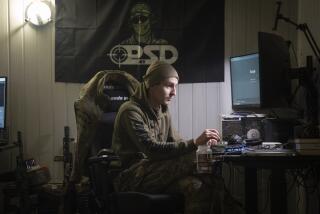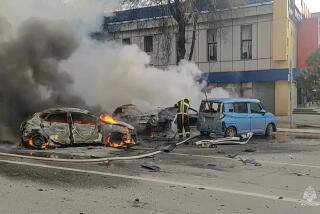With Fall of Grozny, the Real War Begins
MOSCOW — With the capture of Chechnya’s shattered capital, Moscow can claim a symbolic victory that will play well in next month’s presidential election, but for Russia’s conscript army, the fall of Grozny marks the start of a guerrilla war that could last years.
As many as 8,000 well-armed, well-trained separatist fighters have retreated to the steep Caucasus Mountains, where they will be able to regroup in the coming months, hide from Russian bombers and begin launching surprise assaults against federal forces in the rebel republic.
The brutal war, dominated so far by Russia’s relentless bombing campaign, will change character as immobile government garrisons and their supply convoys become ready targets for the hardened Chechen rebels.
“It is possible to predict already that guerrilla warfare will go on in Chechnya for a very long period of time,” said Gen. Makhmut A. Gareyev, president of the Russian Academy of Military Sciences. “The final resolution of the conflict in Chechnya still remains very remote.”
Acting Russian President Vladimir V. Putin, who rose to popularity on the strength of the Chechen war, has rejected a negotiated settlement of the conflict and refuses to allow talks with any of the rebels.
Instead, Russian generals plan to base an occupying force in Chechnya, create a “sanitary cordon” along the base of the Caucasus Mountains and try to contain the rebels. Russian officials insist that they will pursue the insurgents and destroy them in the mountains--although history suggests that a Russian victory in the rugged terrain is highly unlikely.
“Next, we should see complete destruction of the major armed gangs, their dispersal and destruction,” Putin asserted Monday in a televised interview. “And then, as the military already said, we will begin a planned withdrawal of military units from Chechen territory while stationing an armed forces division there on a permanent basis.”
From a short-term, political standpoint, the strategy is likely to work so well that Putin could win the presidency outright in the March 26 election without facing a runoff.
“The declaration of a victory in Grozny ties very neatly into the final stage of Putin’s presidential campaign,” said analyst Viktor A. Kremenyuk, deputy director of Moscow’s USA-Canada Institute. “The timing is perfect to finish up large-scale combat activities and instead engage in pompous drum-beating.”
After the presidential election, however, the war is likely to drag on indefinitely.
The rebels, who were able to hold off for months the Russian forces attacking Grozny despite massive aerial bombing, suffered heavy casualties as they retreated from the city, with several top commanders killed or wounded. On Tuesday, the Russian military claimed that Chechen Vice President Vakha Arsanov was among those killed during the rebel escape from the city, although his death was not confirmed by the Chechens.
Despite their losses, however, the Muslim separatists remain a formidable foe. The volunteer Chechen army is better trained and more experienced than the rookie Russian soldiers it faces. The rebels remain well armed, having begun stockpiling weapons years ago. And they have repeatedly demonstrated the ability to sneak through federal lines in significant numbers and launch surprise attacks against Russian troops.
Chechnya’s resentment of its annexation by Russia has persisted since the 1800s. During World War II, Soviet dictator Josef Stalin shipped the Chechens to Kazakhstan, where they were forced to remain until the 1950s. With the breakup of the Soviet Union in 1991, Chechnya declared independence. Russia invaded in 1994, and the ensuing 21-month war ended with the republic winning de facto independence while nominally remaining part of Russia.
Military analysts are quick to point out that Putin’s claim Sunday of victory in Grozny is largely meaningless, because the rebel force remains intact and will regroup to fight another day.
“It is nothing but a virtual victory, the declaration of which was needed by the Kremlin to score decisive points in Putin’s presidential campaign,” said retired Col. Alexander I. Zhilin, a military analyst with the weekly Moskovskiye Novosti. “They are trying hard to drive it into the subconscious of the people that a great victory has been achieved with comparatively small federal losses. But it is all a lie.”
Zhilin disputed claims by Russian commanders that federal forces had killed 1,500 rebels as the guerrillas retreated from Grozny, including many in minefields.
“I am a military man, and I can tell you that to get 1,500 men blown up in a minefield, you need to make them not just run or walk through the minefield but to deliberately search for mines to blow themselves to pieces,” he said. “Since the federal authorities haven’t shown pictures of more than 20 bodies yet, we can say with all confidence that the rebels escaped and are now spread all over the hills, lying in ambush once again.”
While the Russians fight to take territory, the rebels will fight a guerrilla war, blending into the population and drawing support from it. Russian brutality and atrocities such as the alleged execution of at least 22 civilians in Grozny will only strengthen backing for the rebels.
Now that the Russians control the ruined city, the army will need to find a way to keep the insurgents from taking it back--as they did in the 1994-96 war. Grozny is large, and the occupying forces will be spread out.
“As Russian troops gain control of more and more of Chechnya’s territory, they naturally become more and more scattered, which in turn makes them more vulnerable to Chechen attacks,” Gen. Gareyev said. “This applies in the first place to the garrison stationed in Grozny--the city will continue to remain a target of Chechen raids.”
Pavel Felgenhauer, a military analyst with the daily newspapers Sevodnya and the English-language Moscow Times, said Putin is fighting a war that is unwinnable.
“His real aim should be to destroy the will of the enemy to resist so that the enemy lays down arms,” he said. “From the start, the strategy has been flawed. To bombard them all dead is not achievable--it never happens except in computer games.”
As the war continues, Felgenhauer said, the quality of the Russian troops will only worsen and fighting the war will become increasingly expensive.
Many of the more experienced soldiers are already being sent home, under the army’s current rules, and there aren’t enough trained troops to replace them. Russia’s bombing campaign has eaten into the supply of munitions, and the army already is using shells manufactured during the 1960s and even the 1950s, Felgenhauer said. Similarly, some equipment being used by the army dates to the 1950s.
“It makes the war cheap,” he said. “But as it drags on, they will be incapable of keeping it really cheap.”
More to Read
Sign up for Essential California
The most important California stories and recommendations in your inbox every morning.
You may occasionally receive promotional content from the Los Angeles Times.










